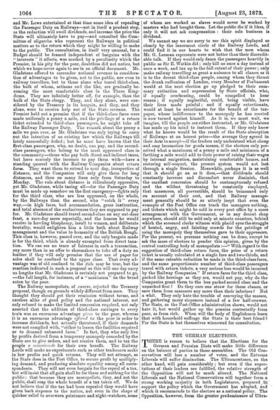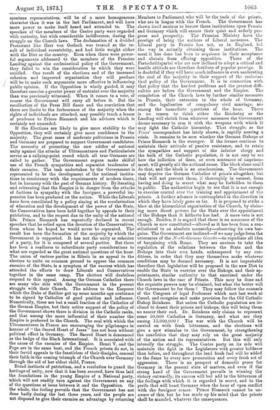THE GERMAN ELECTIONS.
THERE is reason to believe that the Elections for the German and Prussian Diets will make little difference on the balance of parties in these assemblies. The Old Con- ' servatives will lose a number of votes, and the Extreme Liberals will suffer diminution. The Ultramontanes, on the other hand, will gain considerably ; but even if the expec- tations of their leaders are fulfilled, the relative strength of the Opposition will not be much altered. The National Liberals and the National Conservatives will together form a strong working majority in both Legislatures, prepared..* support the policy which the Government has adopted, and - which it recommends to the electors as a national policy. The Opposition, however, from the greater predominance of Ultra-
montane representatives, will be of a more homogeneous character than it was in the last Parliament, and will have more power to make itself heard and attended to. The speeches of •the members of the Centre party were regarded with cariosity, but with considerable indifference, during the struggle on the Church laws. The declamation of a decided Protestant like Herr von Gerlach was treated as the re- sult of individual eccentricity, and had little weight either with the Diet or the country. Even when there were power- ful arguments addressed to the members of the Prussian Landtag against the ecclesiastical policy of the Government, they failed to win the consideration to which they were entitled. One result of the elections and of the increased cohesion and improved organisation they will produce will be to make such arguments more effective in influencing public opinion. If the Opposition is wisely guided, it may therefore exercise a greater power of restraint over the majority than was previously witnessed. When it comes to a vote, of course the Government will carry all before it. But the recollection of the Press Bill fiasco and the conviction that there are limits to the forbearance of the majority when the rights of individuals are attacked, may possibly teach a lesson of prudence to Prince Bismarck and his advisers which is certainly not unneeded.
If the Elections are likely to give more stability to the Opposition, they will certainly give more confidence to the majority. The great mass of moderate politicians in Prussia and Germany are prepared to support Government candidates. The necessity of protecting the new edifice of national unity against the attacks of Ultramontanes and Particularists serves as a rallying-point round which all true Germans are called to gather. The Government organs make skilful use of the French sympathies and separatist tendencies of their enemies. The task undertaken by the Government is represented to be the development of the national institu- tions in consistency with the requirements of modern times, but in harmony with the past of German history. By iterating and reiterating that the Empire is in danger from the attacks of factions in sympathy with the foreigner, a powerful im- pression has been produced on the nation. While the Liberals have been conciliated by a policy aiming at the secularisation of education and the development of the power of the State, the Conservatives have been held together by appeals to their patriotism, and to the respect due to the unity of the national life. Prince Bismarck has repeatedly declared in recent speeches that he relied upon the devotion' of the Conservatives, from whom he hoped he would never be separated. The result has been the formation of the majority by which the Government is supported. It has not the unity or cohesion of a party, for it is composed of several parties. But there has been a readiness to subordinate party considerations to what are regarded as the great national questions of the hour. The union of various parties in Silesia in an appeal to the electors to unite on common ground to oppose the common enemies of the State, is a symptom of the success which has attended the efforts to draw Liberals and Conservatives together in the same camp. The electors will doubtless respond to this appeal. Among the German Catholics there are many who side with the Government in the present struggle with their Church. The address to the Emperor which the Duke of Ratibor got up some months ago continues to be signed by Catholics of good position and influence. Numerically, these are but a small fraction of the Catholics of the German Empire, but their active support of the policy of the Government shows there is division in the Catholic ranks, and that among the more influential of their number the Empire is preferred to the Church. The zeal with which the Ultramontanes in France are encouraging the pilgrimages in honour of " the Sacred Heart of Jesus " has not been without political effect in Germany. The Sacred Heart is denounced as the badge of the Black International. It is associated with the cause of the enemies of the Empire. Henri V. and the Pope are in the same boat, and the French priests do not, in their fervid appeals to the fanaticism of their disciples, conceal their faith in the coming triumph of the Church over Germany through the aid of her eldest child, France. Broad instincts of patriotism, and a resolution to guard the heritage of unity, now that it has been secured, have thus laid the foundations in the young Empire of a National party, !inch will not readily turn against the Government on any of the questions at issue between it and the Opposition. On the whole, the feeling prevails that the Government has not done badly during the last three years, and the people are not disposed to give their enemies an advantage by returning Members to Parliament who will be the tools of the priests, who are in league with the French. The Government has shown itself anxious to bestow those institutions upon Prussia and Germany which will ensure their quiet and orderly pro- gress and prosperity. The Prussian Ministry have the prestige of being the authors of Liberal measures. The Liberal party in Prussia has not, as in England, led the way in actually obtaining these institutions. The most it has done has been to acquiesce in their acceptance and abstain from offering opposition. Those of the Fortschrittspartei who are now inclined to adopt a critical and hostile attitude are therefore destitute of popular prestige. It is doubtful if they will have much influence in even moderating the zeal of the majority in their support of the ecclesias- tical policy of the Government. It is in connection with that policy that the hardest problems and the greatest diffi- culties are before the Government and the Empire. The completion of the Church laws by further similar measures in Prussia, their extension to the whole of Germany, and the legalisation of compulsory civil marriage, are
among the immediate questions of the hour. There is no reason to think either the Reichstag or the Landtag will shrink from whatever measures the Government deems necessary to arm it with the weapons with which it may fight the Catholic hierarchy. That struggle, as the Times' correspondent has lately shown, is rapidly nearing a crisis. It remains to be seen whether the German Bishops or Prince Bismarck is the stronger. If the former continue to maintain their attitude of passive resistance, and to retain the sympathies and support of the inferior clergy and the bulk of the Catholic population, it is not easy to see how the infliction of fines, or even sentences of imprison- ment, will greatly aid the national cause. The block alone could do that, and the block is an anachronism. The Government may deprive the German Catholics of priests altogether, but that will not prevent them, if thoroughly in earnest, from having and doing in secret what may be forbidden to them in public. The authorities begin to see that it is not enough to exercise control over the training and appointment of the priests. A further advance is contemplated in the direction in which they have lately gone so far. It is proposed to strike a blow at the hierarchical organisation of the Church, by claim- ing more direct powers for the State over the appointment of the Bishops than it hitherto has had. A mere veto is not enough. Besides, it is argued that there is no assurance of the Church as now constituted—altered as it has been from a con- stitutional to an absolute monarchy—observing its own bar- gains. The Government are inclined—if we may judge from the utterances of the North-German Gazette—to repudiate all idea of bargaining with Rome. They are anxious to take the regulation of the relations between the State and the Bishops into their own hands, unhampered by any con- ditions, in order that they may themselves make whatever conditions may be deemed necessary. It is not improbable therefore that legislation will be proposed in the new Diet to enable the State to exercise over the Bishops, and their ap- pointments, similar authority to that exercised under the Church laws in the case of Priests. This may be done and the requisite powers may be obtained, but what the better will the Government be for them ? They may follow the counsels of the Congress of legal Professors which met last week at Cassel, and recognise and make provision for the Old Catholic Bishop Reinkens. But unless the Catholic population are in- clined to desert their priests and bishops, this will bring them no nearer their end. Dr. Reinkens only claims to represent some 50,000 Catholics in Germany, and what are they among 13,000,000 ? The war with the Church will be carried on with fresh bitterness, and the elections will give a now stimulus to the Government, by strengthening the conviction that they may rely on the great majority of the nation and its representatives. But this will only intensify the struggle. The Centre party on its side will maintain the fight in the Legislature with greater boldness than before, and throughout the land fresh fuel will be added to the flame by every new prosecution and every fresh act of aggression. There is no prospect of domestic peace for Germany in the present state of matters, and even if the strong hand of the Government prevails in winning the victory outwardly, its success will but add to the bitterness of the feelings with which it is regarded in secret, and to the perils that will beset Germany when the hour of open conflict with the foreigner comes. Prince Bismarck cannot be un- aware of this, but he has made up his mind that the priests shall be muzzled, whatever the consequences.































 Previous page
Previous page